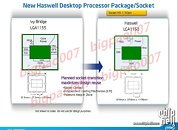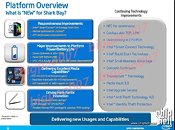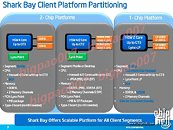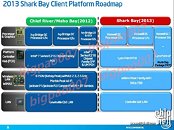- Joined
- Oct 9, 2007
- Messages
- 47,677 (7.43/day)
- Location
- Dublin, Ireland
| System Name | RBMK-1000 |
|---|---|
| Processor | AMD Ryzen 7 5700G |
| Motherboard | Gigabyte B550 AORUS Elite V2 |
| Cooling | DeepCool Gammax L240 V2 |
| Memory | 2x 16GB DDR4-3200 |
| Video Card(s) | Galax RTX 4070 Ti EX |
| Storage | Samsung 990 1TB |
| Display(s) | BenQ 1440p 60 Hz 27-inch |
| Case | Corsair Carbide 100R |
| Audio Device(s) | ASUS SupremeFX S1220A |
| Power Supply | Cooler Master MWE Gold 650W |
| Mouse | ASUS ROG Strix Impact |
| Keyboard | Gamdias Hermes E2 |
| Software | Windows 11 Pro |
Here are the first slides detailing Haswell, Intel's next generation processor architecture that succeeds Sandy Bridge and Ivy Bridge. Intel follows a "tick-tock" product development model. Every year, Intel's product lineup sees either of the two. A "tock" brings in a new x86 architecture, a "tick" miniaturizes it to a newer silicon fabrication process. For example, Sandy Bridge is Intel's latest architecture, and is based on the 32 nm fab process. Ivy Bridge is a miniaturization of Sandy Bridge to 22 nm. Likewise, Haswell will be a brand new architecture, it will use the 22 nm fab process cemented by Ivy Bridge.
If all goes well with Intel's 22 nm process, Haswell is scheduled for Q2 2013. 2012 (Q2 onwards) will be led by Ivy Bridge. But then here's a "shocker": Haswell's desktop version will use a brand new socket, LGA1150, and will be incompatible with LGA1155. This is because of drastic changes in the pin map of the package. Sandy Bridge and Ivy Bridge share the LGA1155 socket, and will hence, have kept the socket alive for over 2 years. A major change with the component arrangement in the platform that is affecting Haswell's pin map is that Haswell will have a higher bandwidth chipset bus, rearranged PCIe pins (with FDI pins), rearranged power pins, and miscellaneous pins. It does away with a separate power domain for the integrated graphics controller.





Haswell will bring several new features to the table, including next-generation RapidStart quick boot capabilities that reduce cold-boot times to 2 seconds. The processor's IPC will be increased over Ivy Bridge. The mobile version will include features that will further increase battery life of mainstream notebooks. Haswell will feature improved media HD to HD transcoding capabilities. It will bring technologies such as NFC (near-field communication), and Thunderbolt (10 Gbps interconnect) to the masses.
Moving on to the platform itself, it is named "Shark Bay", and will be available in 2-chip quad-core and 1-chip dual-core variants. The quad-core chips and some dual-core chips will use the usual socketed motherboards with a single-chip chipset (PCH) which is smaller than today's PCH chips, while the some dual-core chips will completely integrate the PCH into the processor's package, eliminating an external chipset. The dual-core chips will be available in BGA packages.
View at TechPowerUp Main Site
If all goes well with Intel's 22 nm process, Haswell is scheduled for Q2 2013. 2012 (Q2 onwards) will be led by Ivy Bridge. But then here's a "shocker": Haswell's desktop version will use a brand new socket, LGA1150, and will be incompatible with LGA1155. This is because of drastic changes in the pin map of the package. Sandy Bridge and Ivy Bridge share the LGA1155 socket, and will hence, have kept the socket alive for over 2 years. A major change with the component arrangement in the platform that is affecting Haswell's pin map is that Haswell will have a higher bandwidth chipset bus, rearranged PCIe pins (with FDI pins), rearranged power pins, and miscellaneous pins. It does away with a separate power domain for the integrated graphics controller.





Haswell will bring several new features to the table, including next-generation RapidStart quick boot capabilities that reduce cold-boot times to 2 seconds. The processor's IPC will be increased over Ivy Bridge. The mobile version will include features that will further increase battery life of mainstream notebooks. Haswell will feature improved media HD to HD transcoding capabilities. It will bring technologies such as NFC (near-field communication), and Thunderbolt (10 Gbps interconnect) to the masses.
Moving on to the platform itself, it is named "Shark Bay", and will be available in 2-chip quad-core and 1-chip dual-core variants. The quad-core chips and some dual-core chips will use the usual socketed motherboards with a single-chip chipset (PCH) which is smaller than today's PCH chips, while the some dual-core chips will completely integrate the PCH into the processor's package, eliminating an external chipset. The dual-core chips will be available in BGA packages.
View at TechPowerUp Main Site






